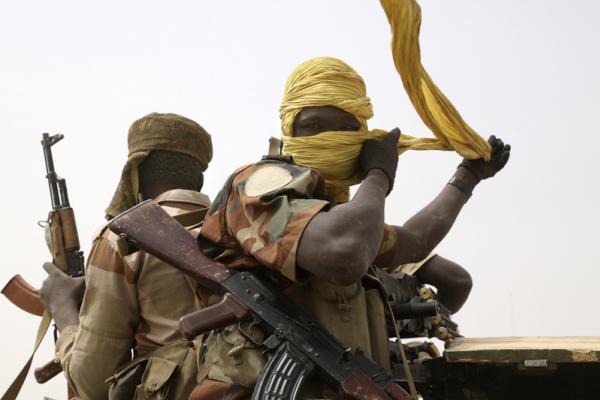Boko Haram’s leader has pledged allegiance to the Islamic State in a new audio message, according to a group that monitors extremist activity.
In the recording, a man claiming to be Abubakar Shekau, leader of the Nigerian terrorist group that has killed thousands, vowed to follow Islamic State leader Abu Bakr al-Baghdadi, the U.S.-based SITE Intel Group, announced on March 7.
“We announce our allegiance to the Caliph of the Muslims … and will hear and obey in times of difficulty and prosperity, in hardship and ease, and to endure being discriminated against, and not to dispute about rule with those in power, except in case of evident infidelity regarding that which there is a proof from Allah,” Shekau said in a tweeted message that went along with the video, according to the Associated Press. Al-Baghdadi is the self-proclaimed head of the caliphate.
Flashpoint Intelligence, a global security firm, confirmed the recording to NBC News and said it was posted on Boko Haram social media accounts. USA Today was not able to independently verify the message.
The pledge would make Boko Haram the largest extremist group to agree to fight under the Islamic State, The New York Times reported. Still, it’s uncertain what level of coordination the two terrorism groups would have, though there has been growing signs of a link between them.
“It’s quite clear that since at least mid-January, the Islamic State has had some level of connection with Boko Haram,” Aaron Zelin, a fellow at the Washington Institute who tracks propaganda by Islamist extremists, told the Times.
“The key question is whether the Islamic State dispatched individuals from Syria or Iraq or else from Libya, down to northern Nigeria to help out with operations on the ground, or else with methodology, or in terms of governance activities.”
The developments came as five suicide bombing attacks hit the northeastern Nigerian city of Maiduguri on March 7, killing at least 54 people and injuring another 143 in an attack that bore the hallmarks of the group, the Associated Press reported.
The blasts occurred over four hours in locations from a busy fish market to a crowded bus station, said Police Commissioner Clement Adoda.
A fifth explosion from a car bomb at a military checkpoint 50 miles outside the city wounded a soldier and two members of a civilian self-defense unit. The bomber apparently wanted to reach Maiduguri, said a police officer at the scene who spoke on condition of anonymity because he is not allowed to speak to the press.
In the deadliest blast, 18 people died when a suicide bomber blew himself up in a tricycle taxi at the entrance to the bustling Baga fish market, police said.
Boko Haram, which kidnapped hundreds of schoolgirls last year, has killed at least 13,000 people and forced nearly 1.2 million to flee to southern Nigeria, as well as neighboring Chad, Cameroon, and Niger. Its name means “Western education is forbidden” in the Hausa language, and the militants claim a territory in northern Nigeria that’s the size of West Virginia.
In recent months, Boko Haram has upped its threats, vowing nearly three weeks ago to disrupt Nigeria’s elections, which had been moved six weeks later than scheduled to March 28 over security concerns related to the group. The delay, however, brought skepticism that President Goodluck Jonathan — who has largely been ineffective against the militants — is trying to hold on to power in a historically tight race.
In the meantime, Boko Haram has only increased attacks, entering neighboring countries, including Chad, Cameroon, and Niger. The African Union has assembled a multinational force of 8,800 troops to combat the group.
Earlier this week, Boko Haram militants began massing at their headquarters in the northern Nigerian town of Gwoza in preparation for a battle with the multinational troops, the Associated Press reported, citing residents and an intelligence officer. In recent weeks, Chad and Nigerian troops have been able to retake several towns from the militants, but victory at Gwoza would be a major boost for Jonathan.
Boko Haram’s pledge adds to a growing number of jihadist groups that have pledged allegiance or support to the Islamic State, which has seized large swaths of Iraq and Syria and been under near-constant attack from U.S. coalition-led airstrikes since last year.
Katharine Lackey writes for USA Today. Via RNS.
Got something to say about what you're reading? We value your feedback!
